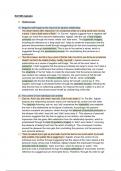Summary
Summary Edexcel English Lit A* Poems of the Decade essay plans
- Module
- Unit 3 - Poetry
- Institution
- PEARSON (PEARSON)
I have compiled various essay plans for the Poems of the Decade for Unit 3 Poetry, including: Eat Me, History, An Easy Passage, Please Hold, Ode on a Grayson Perry Urn, Genetics, The Lammas Hireling, and The Gun. The plans consist of various broad essay themes, which have been broken down into mo...
[Show more]



